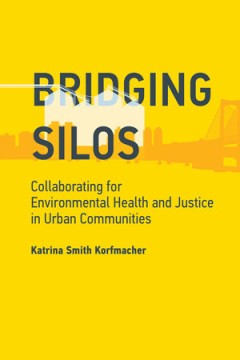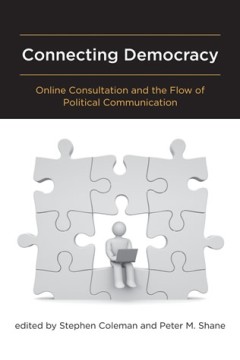Filter by

Bridging the silos :collaborating for environment, health, and justice in urb…
OCLC-licensed vendor bibliographic record.
- Edition
- -
- ISBN/ISSN
- 9780262354981
- Collation
- 1 online resource (376 pages) :illustrations.
- Series Title
- -
- Call Number
- -

Remaking Berlin :a history of the city through infrastructure, 1920-2020
"The first carefully researched historical analysis of the co-evolution of Berlin and its infrastructure services"--OCLC-licensed vendor bibliographic record.
- Edition
- -
- ISBN/ISSN
- 9780262360906
- Collation
- 1 online resource.
- Series Title
- -
- Call Number
- -

Cheap and Clean: How Americans Think about Energy in the Age of Global Warming
"How do Americans think about energy? Is the debate over fossil fuels highly partisan and ideological? Does public opinion about fossil fuels and alternative energies divide along the fault between red states and blue states? And how much do concerns about climate change weigh on their opinions? In Cheap and Clean, Stephen Ansolabehere and David Konisky show that Americans are more pragmatic th…
- Edition
- -
- ISBN/ISSN
- 0262321068
- Collation
- 1 online resource (x, 261 pages)
- Series Title
- -
- Call Number
- -

Sidewalks :conflict and negotiation over public space
Examines the evolution of an undervalued urban space and how conflicts over competing uses--from the right to sit to the right to parade--have been negotiated.Urban sidewalks, critical but undervalued public spaces, have been sites for political demonstrations and urban greening, promenades for the wealthy and the well-dressed, and shelterless shelters for the homeless. On sidewalks, decade aft…
- Edition
- -
- ISBN/ISSN
- 9780262255462
- Collation
- 1 online resource (x, 328 pages) :illustrations, map.
- Series Title
- -
- Call Number
- -

A History of American Privateers
American privateers played a significant role during the American War of Independence and the Anglo-American war of 1812, as the American regular navy was very small. Reinforcement by privateers sailing under the government's jurisdiction carrying Letters of Marque was essential, and in fact both sides made use of privateers, capturing each other's merchant ships as prizes. Many successful sail…
- Edition
- -
- ISBN/ISSN
- 9780511793707
- Collation
- -
- Series Title
- -
- Call Number
- -

Inventing American history
American public history—in magazines and books, television documentaries, and museums—tends to celebrate its subject at all costs, even to the point of denial and distortion. This does us a great disservice, argues William Hogeland in Inventing American History. Looking at details glossed over in three examples of public history—the Alexander Hamilton revival, tributes to Pete Seeger and …
- Edition
- -
- ISBN/ISSN
- 9780262254960
- Collation
- 1 online resource (xiv, 132 pages).
- Series Title
- -
- Call Number
- -

Dialogues in Public Art
"Dialogues in Public Art presents a blend of interviews with the people who create and experience public art - from an artist who mounted three bronze sculptures in the South Bronx to the bureaucrat who led the fight to have them removed; from an artist who describes his work as a "cancer" on architecture to a pair of architects who might agree with him; from a artist who formed a coalition to …
- Edition
- -
- ISBN/ISSN
- 9780262272667
- Collation
- -
- Series Title
- -
- Call Number
- -

Measuring the Tax Burden on Capital and Labor
A guide to current approaches to measuring the effective tax rate, with case studies that illustrate the different methods discussed.Today's highly complicated tax codes have led economists and policy makers depend on simplified summary measures in order to understand how taxes affect the economy. Studies of the effective tax rate--that is, a measurement of the net amount of tax levied on certa…
- Edition
- -
- ISBN/ISSN
- 9780262284097
- Collation
- -
- Series Title
- -
- Call Number
- -

Public sector economics and the need for reforms
Theoretically and empirically informed studies on the role and efficiency of the public sector, public wage and employment policy, privatization, tax policy, and fiscal sustainability.OCLC-licensed vendor bibliographic record.
- Edition
- -
- ISBN/ISSN
- 9780262332361
- Collation
- 1 online resource.
- Series Title
- -
- Call Number
- -

Connecting democracy :online consultation and the flow of political communica…
From the publisher. The global explosion of online activity is steadily transforming the relationship between government and the public. The first wave of change, "e-government," enlisted the Internet to improve management and the delivery of services. More recently, "e-democracy" has aimed to enhance democracy itself using digital information and communication technology. One notable example o…
- Edition
- -
- ISBN/ISSN
- 9780262298803
- Collation
- 1 online resource (ix, 423 pages)
- Series Title
- -
- Call Number
- -
 Computer Science, Information & General Works
Computer Science, Information & General Works  Philosophy & Psychology
Philosophy & Psychology  Religion
Religion  Social Sciences
Social Sciences  Language
Language  Pure Science
Pure Science  Applied Sciences
Applied Sciences  Art & Recreation
Art & Recreation  Literature
Literature  History & Geography
History & Geography